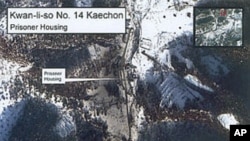The U.N. expert who assesses the human rights situation in North Korea is calling upon the government to urgently begin releasing the estimated 200,000 political prisoners in the country’s jails. Meanwhile, his counterpart who monitors Burma said that despite many positive developments, ongoing and serious human rights issues remain to be addressed there.
Special rapporteur Marzuki Darusman said he is concerned by satellite images that show a “significant increase” in the scale of North Korean political prison camps over similar images gathered in 2001.
“It is estimated that DPRK’s network of political prisons, some of which are believed to be in operation since 1950, hold up to 200,000 people. I called on the authorities to move forward concretely and urgently on the release of political prisoners,” said Darusman.
Darusman, who is an independent expert appointed by the secretary-general, also expressed concern about the increase in asylum seekers from North Korea, telling reporters their numbers have risen from about 40 escaping to Thailand in 2004 to nearly 2,500 last year.
“Asylum seekers are sometimes “aided” by human traffickers to travel to the neighboring countries and beyond. While most asylum seekers are exploited by traffickers, women and children are particularly vulnerable,” said Darusman.
North Korea’s food insecurity also featured prominently in his report. Darusman warned that food assistance from the international community is shrinking and the country continues to face regular, significant shortages.
His counterpart, Tomás Ojea Quintana, who monitors the situation in Burma, noted some progress since last year’s legislative elections, including the signing into law this month of a bill that allows for the formation of unions and provides for the right to strike, and the recent easing of restrictions on the media and Internet.
But he cautioned that there are still serious human rights issues that remain to be addressed, including the release of the country’s estimated 2,000 political prisoners.
“I am pushing the government to release all remaining [political] prisoners before the end of the year. The government has released some, but those prominent leaders, those who had an important role in the history of Myanmar, they still remain in prison,” said Quintana.
Quintana has visited Burma, which also is known as Myanmar, four times since taking up his post in 2008.
He also expressed concern about the discrimination that ethnic minority groups face, particularly in Northern Rakhine and Chin States, where he said they are prevented from teaching their languages in schools and are denied citizenship.
The special rapporteur noted that tensions in ethnic border areas and conflict with some armed ethnic groups have resulted in attacks on civilian populations, extrajudicial killings, sexual attacks, the recruitment of child soldiers, and arbitrary arrests and detentions.
Quintana said the investigation of allegations of gross and systemic human rights violations should be undertaken by an independent body in an impartial and credible manner as a way to deter future violations and to provide victims with a way to redress abuses committed against them.
UN Experts Urge Release of Political Prisoners in DPRK, Burma








